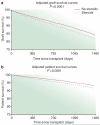Steroid-free maintenance immunosuppression in kidney transplantation: is it time to consider it as a standard therapy?
- PMID: 19625995
- PMCID: PMC3831511
- DOI: 10.1038/ki.2009.248
Steroid-free maintenance immunosuppression in kidney transplantation: is it time to consider it as a standard therapy?
Abstract
Steroid-free immunosuppression in kidney transplantation has been gaining popularity over the past decade, as documented by a continuous and steady rise in the number of kidney transplant patients discharged on steroid-free regimens. This increased interest in steroid-free immunosuppression is fueled by the recognition that half of transplant loss is related to patient death due to cardiovascular disease and/or infectious complications and that the long-term use of steroids contributes to such elevated cardiovascular morbidity and mortality. The availability of newer and more potent immunosuppressive agents has furthered such interest. Many clinical trials over the past two decades have demonstrated the feasibility of steroid-free regimens, at the expense of a slight increase in the rate of acute rejection, which is an important end point in any clinical trial of relatively short duration. The largest epidemiological study to date has reassured the transplant community that the selective use of steroid-free immunosuppression in kidney transplant patients provides no inferior outcome in patient and graft survival at intermediate term. Steroid-free regimens have the potential to improve cardiovascular risk profile. The challenges that remain are to identify the subset of kidney transplant patients who may not benefit from steroid-free immunosuppression and to demonstrate the survival advantage of steroid-free immunosuppresion in suitable kidney transplant candidates.
Figures


References
-
- Murray JE, Merrill JP, Harrison JH, et al. Prolonged survival of human-kidney homografts by immunosuppressive drug therapy. N Engl J Med. 1963;268:1315–1323. - PubMed
-
- Fauci AS, Dale DC. The effect of hydrocortisone on the kinetics of normal human lymphocytes. Blood. 1975;46:235–243. - PubMed
-
- Almawi WY, Hadro ET, Strom TB. Evidence that glucocorticosteroid-mediated immunosuppressive effects do not involve altering second messenger function. Transplantation. 1991;52:133–140. - PubMed
-
- Veenstra DL, Best JH, Hornberger J, et al. Incidence and long-term cost of steroid-related side effects after renal transplantation. Am J Kidney Dis. 1999;33:829–839. - PubMed
Publication types
MeSH terms
Substances
Grants and funding
LinkOut - more resources
Full Text Sources
Medical
Miscellaneous

